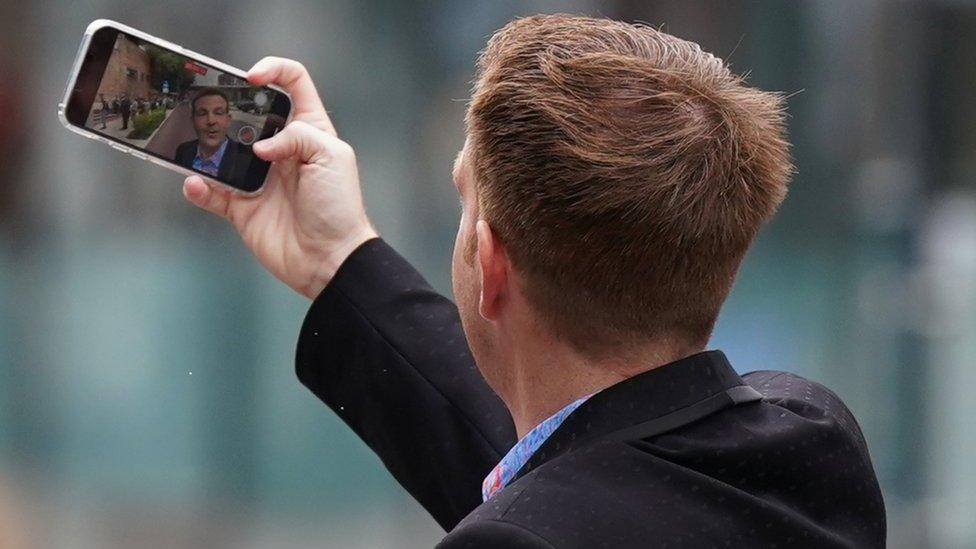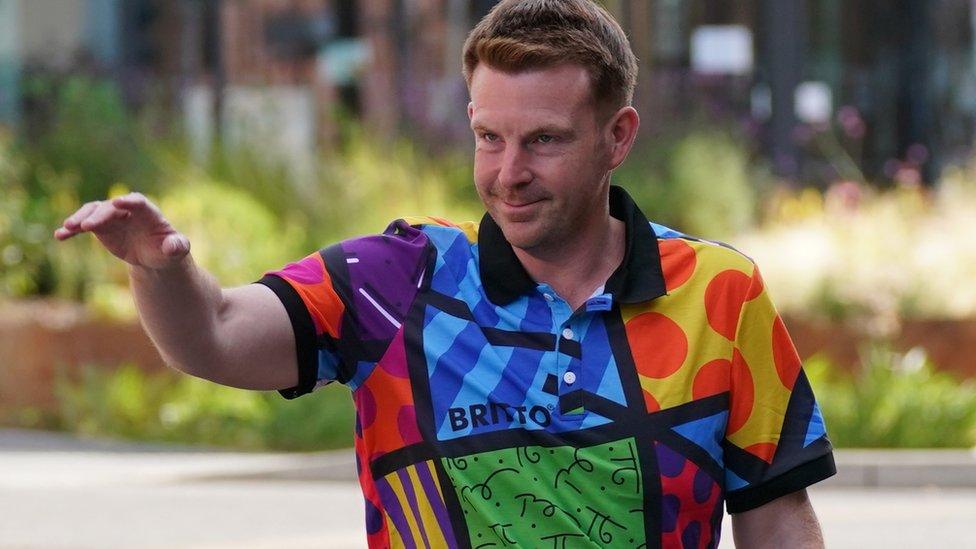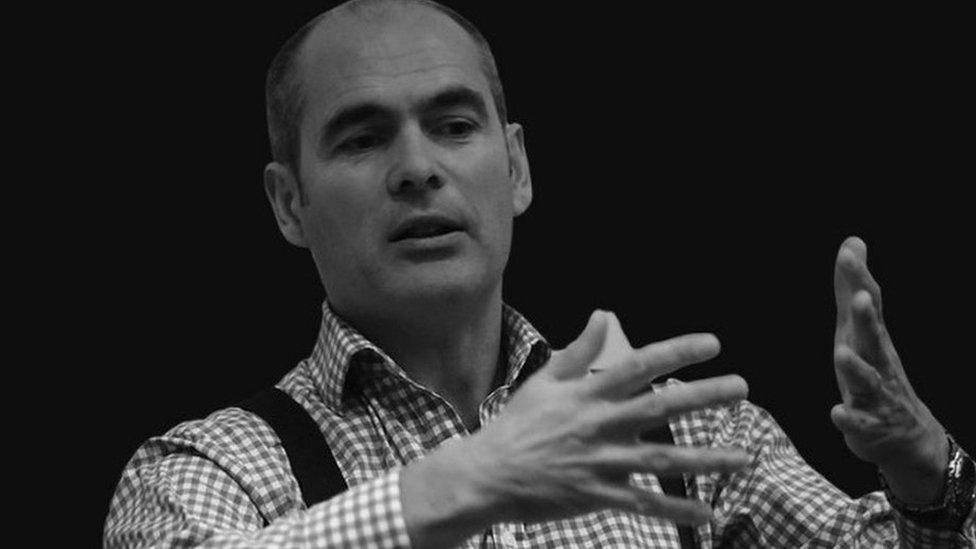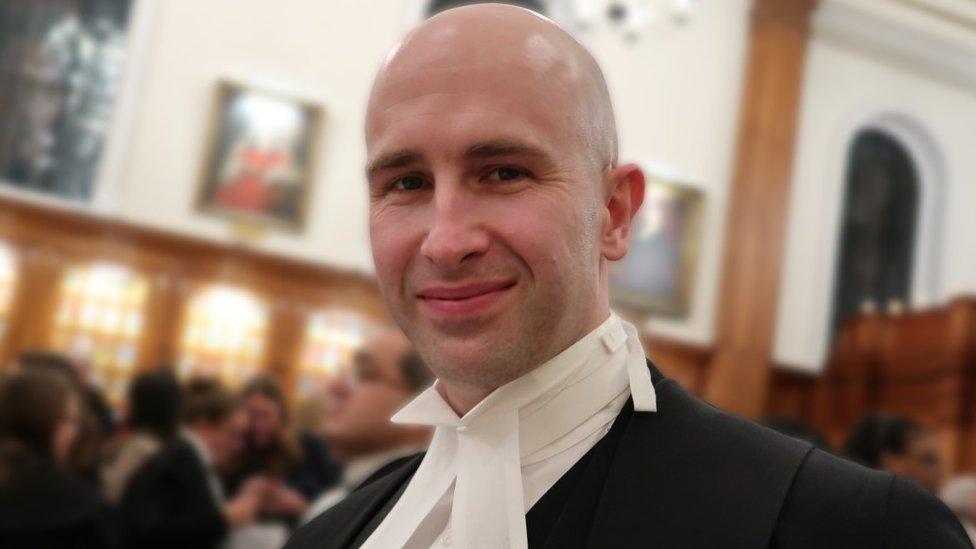Alex Belfield: The stalker who reported on his own trial
- Published

Belfield made videos throughout his trial and posted them on YouTube
Earlier this month, ex-BBC presenter Alex Belfield was jailed for stalking and harassment. His victims included former colleagues at the corporation, among them Radio 2's Jeremy Vine. One striking aspect of the case was that he was given leave by the judge to file social media updates reporting on his own trial.
"Bear in mind, my audience on YouTube is bigger than GB News, Sky News and Talk TV put together."
So said Belfield on his YouTube channel The Voice of Reason, in a video entitled "BBC and police witch-hunt". And while the broadcasters in question might dismiss his audience claims as exaggeration, there is little doubt he reached a lot of people.
On that post alone, Belfield, from Nottingham, attracted more than 183,000 views, 11,000 likes and nearly 2,000 comments.
The most striking aspect of the video was that, even as Belfield was posting it, he was on trial accused of stalking eight people, including some of his former BBC colleagues.
The court heard that the 42-year-old had repeatedly exposed them to hatred as a result of his social media activity.

Belfield's final YouTube video was entitled "Back soon..."
Each day, Belfield - who denied the charges - would appear before judge and jury, and later filmed himself outside the court or at home reporting on the progress of the case.
He would then upload his reports to the same social media channels the Crown Prosecution Service (CPS) said he had continually used to harass his victims.
He was found guilty of four stalking offences and cleared of another four.
Belfield's YouTube channel has more than 350,000 subscribers. His court reports regularly attracted thousands of comments and more than 100,000 views.

Jeremy Vine was one of the BBC stars Belfield was found guilty of targeting
"It was absolutely bizarre," said Jeremy Vine, one of the BBC stars Belfield was found guilty of targeting.
"He was essentially reporting on his own case - I have never heard of it happening before.
"You were watching your stalker read out your evidence online."
Mr Vine believes many of the videos that led to Belfield's prosecution remain in circulation.
The stalker posted an update entitled "Back soon" on the day of his sentencing, on 16 September.
"He tells his followers to copy and share his content - you find the videos popping up all over the place," Mr Vine said.
"Social media companies have got to be liable for this bile.
"If you have somebody using YouTube as a factory of hate, you have got to be more receptive to complaints."
To have a defendant reporting on their own trial was, according to media lawyer Jonathan Coad, unprecedented.
"It's one of those weird, seismic changes of the 21st Century," he said.
"When I started practising law 30 years ago, the power of the individual to inflict their opinion on large numbers of people was restricted to a very small number of people.
"Then, of course, we started to have social media. I have clients with six or seven figure followings who can communicate, at the touch of a button, with more people than a national newspaper can."

Jonathan Coad believes the judge in the case would have had no choice but to grant Belfield leave to report
Mr Coad believes the judge in the case - Mr Justice Saini - would have had no choice other than to grant Belfield leave to file his reports - which totalled more than 30 updates and spanned the entire four weeks of the trial.
"You have a situation where we have a strong emphasis in our courts on open justice," he said.
"The judge will think 'I can't tell him he can't report on the hearings because that would be a flagrant contradiction of the whole essence of open justice'.
"How can you conceptually separate reporters tweeting from the court - which is allowed, external - and telling a defendant he can't comment on the whole trial from his YouTube channel?"
Mr Coad said he could foresee a situation where other defendants followed Belfield's lead - potentially causing great distress to victims along the way.
"We have opted for very little regulation in terms of media coverage of court cases - and that extends to Fleet Street," he said.
"It's bound to happen again. This will put ideas in people's heads - if somebody thinks 'I'm in court for four weeks, I might as well start a YouTube channel and make some money', it's a way of gaining some notoriety."

What are the rules around court reporting?
According to the Independent Press Standards Organisation (IPSO), external it is a fundamental principle of open justice that court proceedings can be reported on by the media in an open and transparent way. Journalists have an obligation to ensure that a report of what was heard in court is accurate and not misleading.
Reports of legal proceedings must be fair and accurate, and any reporting restrictions or statutory prohibitions on reporting complied with.
Any information from other sources must be clearly distinguished in an article from that which was heard in court.
Taking contemporaneous notes during court proceedings is an important way to demonstrate that care has been taken over the accuracy of any subsequent court report.
Some courts require journalists to provide evidence of media accreditation to gain access to proceedings.

The BBC understands the prosecution did not oppose Belfield's reporting of the case.
Following conviction, the judge warned him he needed to be "extra careful about... online communications".

Mr ShenSmith does not believe the case will set a precedent
For another legal expert, the case was more of a one-off, in which Belfield's credentials as a journalist were key in allowing him to file reports on the trial.
"Belfield's situation is fairly unique in that he's a reporter who is also a defendant in the case," said Daniel J ShenSmith, a practising barrister from Lichfield.
"It is presumed that press and legal commentators are not posing a risk to the course of justice and that if things are reported factually, that shouldn't be a problem.
"There can't be open justice if none of it is reported."
Mr ShenSmith, who runs a YouTube channel as the Blackbelt Barrister which aims to demystify the law for the public, said he did not believe the law would change as a result of the case.
"It's an interesting question as to where it goes next and how that's managed and policed, but the ultimate discretion lies with the judge," he said.
"If there were a case where somebody had made serious threats of harm and then wished to report on the proceedings, I believe the judge would probably say no.
"Open justice is a fine balance and I think parliament will be slow to interfere with the rules surrounding it.
"It could be viewed as an attack on the justice system. It's a difficult area."
Since Belfield's conviction, YouTube continues to host his channel.
Videos in which he makes unpleasant remarks about the victims of his stalking remain live.
According to YouTube, he has been suspended from monetising his channel since February for violating their policy on harassment.
"If we see that a creator's off-platform behaviour harms our users, community, employees or ecosystem, we take action to protect the community," a spokesperson said.

Follow BBC East Midlands on Facebook, external, on Twitter, external, or on Instagram, external. Send your story ideas to eastmidsnews@bbc.co.uk, external.